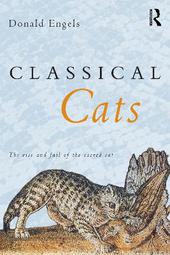
|
Classical Cats: The Rise and Fall of the Sacred Cat
Paperback
Main Details
| Title |
Classical Cats: The Rise and Fall of the Sacred Cat
|
| Authors and Contributors |
By (author) Donald W. Engels
|
| Physical Properties |
| Format:Paperback | | Pages:240 | | Dimensions(mm): Height 234,Width 156 |
|
| Category/Genre | History of specific subjects
Cats as pets |
|---|
| ISBN/Barcode |
9780415261623
|
| Classifications | Dewey:398.245297520901 |
|---|
| Audience | | Undergraduate | | Postgraduate, Research & Scholarly | | Professional & Vocational | | General | |
|---|
| Edition |
New edition
|
| Illustrations |
10 line drawings and 25 b&w photos
|
|
Publishing Details |
| Publisher |
Taylor & Francis Ltd
|
| Imprint |
Routledge
|
| Publication Date |
21 June 2001 |
| Publication Country |
United Kingdom
|
Description
Today when we think of domestic cats, we recall the familiar hearthside companion and the mischievous playmate. It is difficult to comprehend that in the past the animal has played a fundamental role in the development of European and Western civilization. The human relationship to the cat has been important for most of the last four millennia. Domesticated cats were the bulwark of Western societies' defence against rodents and the thirty five or so dangerous diseases they carry, including typhus and the bubonic plague. Cats were also important religious symbols for the goddess Artemis of the Greeks, Diana of the Romans and the Greco-Egyptian goddess, Isis. These divinities were worshipped - mainly by women - throughout Greece, and later in the Roman Empire. The cat has also been a crucial element in European folklore and folktales, the origins of which can be traced to Egypt, Greece and the Roman Empire. In this beautifully illustrated book, Donald Engels charts the history and significance of the cat from ancient Egypt to the middle ages, exploring such phenomena as the worship of the Egyptian cat goddess Bastet, the infamous cat massacres and witch hunts of the thirteenth century, and the role of the cat in combating disease and starvation. Classical Cats presents a unique and entertaining view of the vicissitudes of the cat in history.
Reviews'Deeply researched and profoundly enlightening. For anyone who loves cats, this book will come as a revelation... a compelling read... it is direct, devoid of sentiment and deeply moving, It left me with much to ponder upon.' - Sir Roy Strong, Country Life; 'What a story, my favourite read this year. It has adjusted my attitude to the sacred, the classical... everywhere.' - Victoria Ellis, Darlington Times; 'Well-written and researched - and stunningly illustrated.' - Publishers Weekly; 'A delight for all cat lovers, and an extremely well written and informative source for those who would dig deeper into 'cat lore' and their history in relation to Man.' - Minerva; 'A cornucopia of delights for any literate cat-lover.' - Times Literary Supplement Kirkus Review US:The cat has played a highly significant role in almost all of recorded history. It has been a sacred animal in many religions and held a symbolic place in much folklore. In addition, the cat has always been an important weapon against disease-carrying vermin, as well as a valued domestic pet. On the other hand, many societies have periodically massacred cats for religious, hygienic or ritualistic purposes. Engels surveys the evidence from ancient Egypt, Greece and Rome and well as the civilizations in western Europe, the Byzantine east and the Muslim world during the early middle ages. Interestingly, the cat has long been associated with women: the Egyptians worshipped the cat-goddess Bastet and the cat was an important icon for the Greek goddess Artemis as for Diana among the Romans. (Kirkus UK)
|